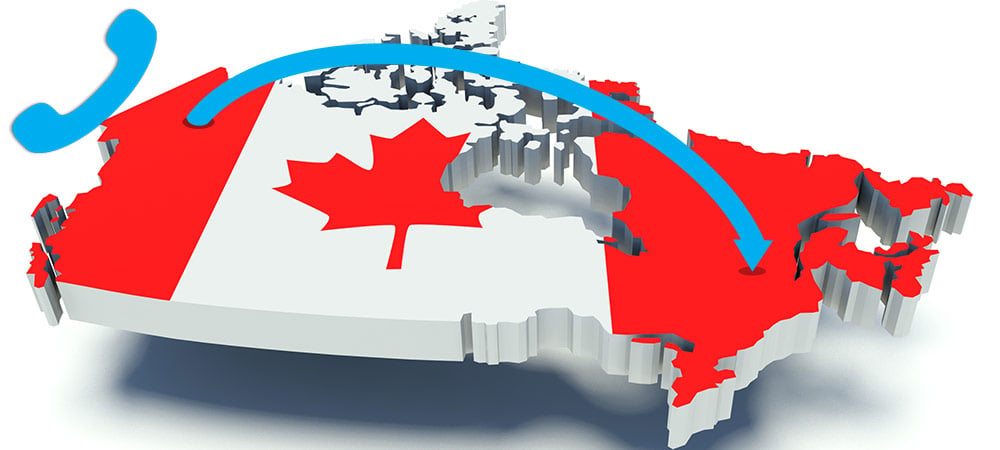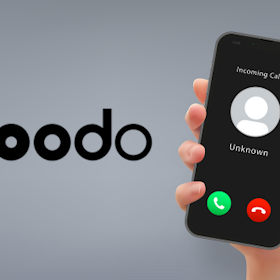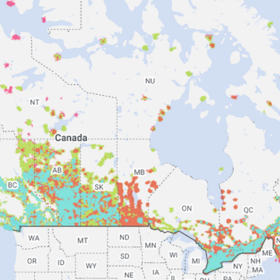
What exactly is a “local call” within Canada, and is it worth paying for a nation-wide plan? Both good questions; both surprisingly difficult to answer.
Special hours
Before we get started, let's cover a couple of exemptions to the local-calling rules.
Most local-calling plans have special hours in which you can make nation-wide calls without penalty. Even better, these time-frames usually don’t count towards your monthly voice cap at all.
The two most common examples are unlimited weekends, where you can send and receive unlimited nation-wide calls from Friday evening until Sunday night, and unlimited evenings, where you can send and receive unlimited nationwide calls within a time period each night, such as from 6pm until midnight.
Exactly when these periods start and end vary based on your carrier, but it’s an easy enough thing to check by logging in to your account and taking a look at your plan.
If your plan features these special hours, and you make most or all of your long-distance calls within the allocated times, then you needn’t really worry about paying extra for a nation-wide plan.
|
Check out Rogers Plans |
Check out TELUS Plans |
Check out Bell Plans |
What is local calling?
Local calling has a different definition depending on whether you’re the one receiving or making the call. If you’re receiving, it’s based on your incoming local-calling area (ILCA). If you’re doing the dialling, it’s your outgoing local-calling area (OLCA).
The borders of your current local-calling area, be it incoming or outgoing, is up to your carrier. If you’re particularly interested in whether a specific call is going to be local or long-distance, try using just the seven digit number + area code. If you don’t receive a warning about long-distance fees, there’s a good chance you’re calling locally.
If you use the full 11-digit number, you’ll connect more quickly but won’t receive any warnings.
Receiving calls (ILCA)
Your ILCA is based on the geographical location that is associated with your number. It has nothing to do with your own physical location at the time you receive a call.
For example, if you live in Vancouver (and your number is associated with Vancouver), and receive a call while within Vancouver, then it counts as a local call.
On the other hand, if you were to take that same plan and travel to another city, let’s say Alberta, and you receive a call, it’s counted as long distance. It wouldn’t even matter if the person doing the calling was standing right next to you.
Your ILCA is an unchanging geographical location. Any calls received while outside it do not count as local. Of course, you can apply to change your ILCA if you move home, but you can’t do it for short-term things like holidays or business trips.
As far as the size of your ILCA, or how its borders are decided upon, is totally up to your carrier. You’ll need to check with them to determine its boundaries or check an LCA map.

Calling out (OLCA)
Unlike your incoming local-calling area, your OLCA is determined entirely by your physical location at the time of a call. OLCA has no ties to any specific geographical location, other than the one in which you’re standing.
In this example, if you live in Vancouver, and are currently in Vancouver, then make a call to someone else in Vancouver, it will be local. Make a call outside Vancouver; long-distance.
If you live in Vancouver, then travel to Toronto, and call someone else in Toronto; still local.
If you live in Vancouver, then travel to Toronto, and call someone back in Vancouver from your location in Toronto; long-distance.
Once again, as far as the size of your OLCA goes, or how its borders are decided upon, is totally up to your carrier. You’ll need to check with them to determine its boundaries.
Why do carriers treat incoming and outgoing calls differently, so far as local calling areas go? It’s a mystery that will never be solved. At least you can take some small consolation that you now know a little more about how the whole thing works.
Are nation-wide plans worth it?
Whether or not paying the extra $5 or so per-month for a nation-wide plan is up to you. How many long-distance calls do you make to Canadian numbers each month, and what does your carrier charge for long-distance fees?
As you might expect by now, there’s no easy answer. Some carriers, like Telus, make it relatively easy to follow how much a long-distance call will cost. Others, like Bell, have a veritable chart of different fees based on where you are calling from and to.
Given the relatively low price difference between local and long-distance plans, if you regularly place calls outside of your OLCA – anything upwards of 10 minutes per month – then it’s probably a good idea to go with a nation-wide plan.
If you don’t, or very rarely, call long-distance, then you could get away with saving that bit of monthly cash.
Smaller carriers often don't bother
Carriers outside of the major three often don't even have options for local-calling plans; all their plans feature nation-wide calls. This is more in line with how the rest of the world does business. Countries like the USA and Australia once charged differently for local and long-distance wireless calls within their national boundaries, but no more.
It's likely Canada will one day follow suit, but for now trailblazers like WIND, Koodo, Fido and Virgin Mobile, among many others, lead the way.
|
Check out WIND Plans |
Check out Fido Plans |
Check out Koodo Plans |
Check out Virgin Mobile Plans |
Original Canada Map image and incoming call image from Shutterstock
Related Articles
Related Topics
Virgin Plus Bell Freedom Mobile Telus Fido Rogers Koodo Freedom MobilePopular Topics
Android Apple iPhone Samsung Google iOS Cell phone plans Rogers Telus BellFind Better Phones and Plans
Hundreds of cell phone plans unpacked. All the facts. No surprises.



































